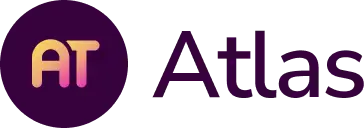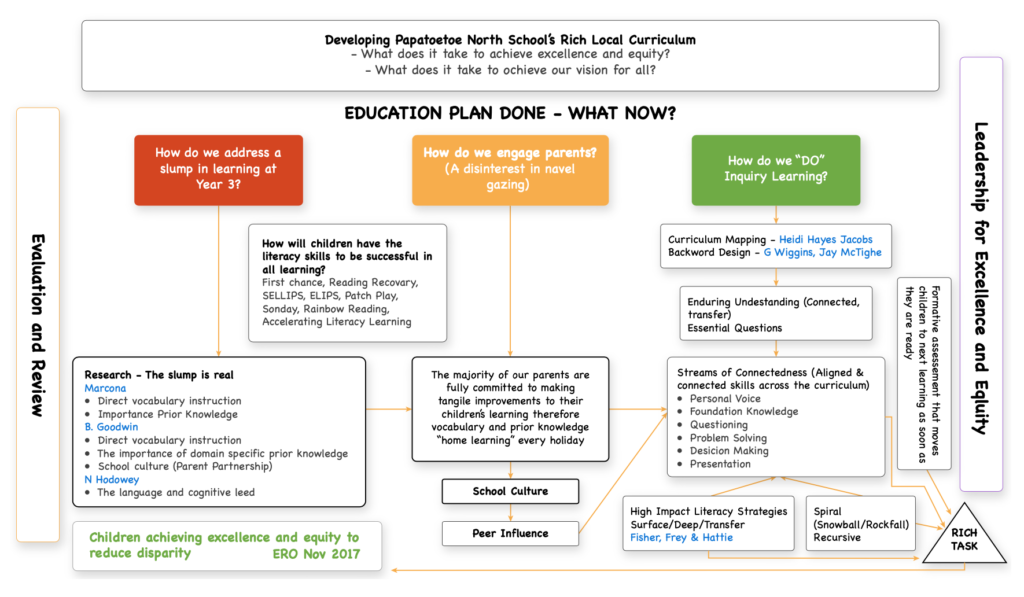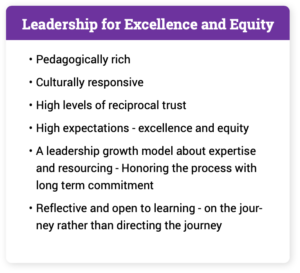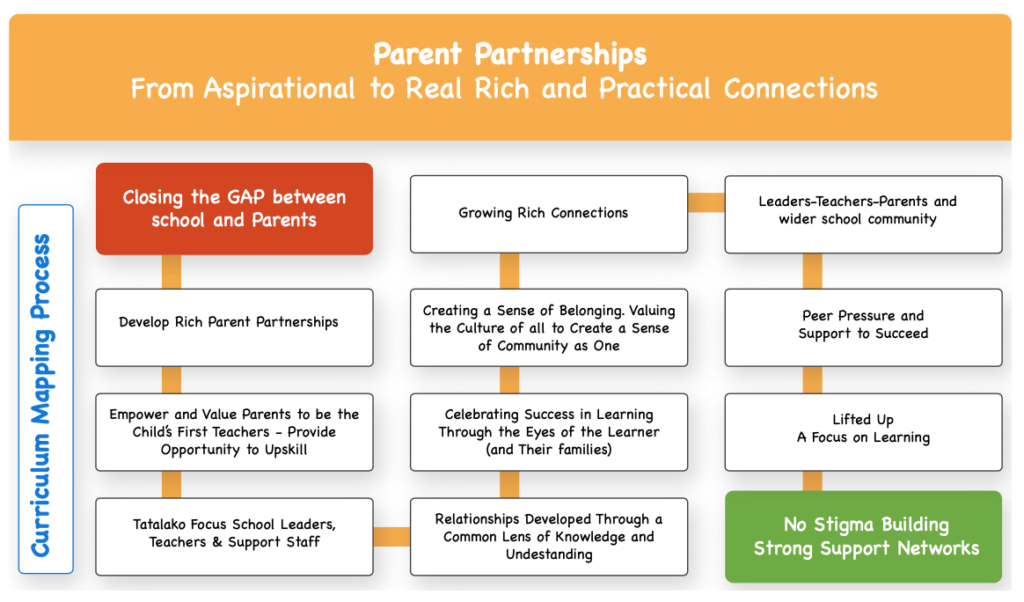Connecting curriculum, culture, and community to student achievement at Papatoetoe North.
Our Story
Papatoetoe North School is a large multicultural primary school in Auckland, New Zealand. Our predominant ethnicities are 50% Pasifika, 21% Maori, and 25% Indian. There are approximately 300 funded English Language Learners (ELLs), with at least half the children working to acquire English at any one time. Consequently, we place an imperative on starting learning in the “known” for each child in order to reduce any cultural gap they may experience throughout their time with us.
Our journey began as we identified a trend whereby a significant number of our ELLs children, “make good academic progress, but fall behind around 3rd grade because of the changing cognitive demands of increasingly print based instruction” (Olsen 2006). This was identified in 2007 when, despite a strong reading foundation that had led to high levels of achievement over a sustained period, school wide analysis of Oral Language, Science and Technology achievement data highlighted a slump in Year 4. This slump followed international trends where achievement continued to decline through to Year 6. International assessment studies confirm that the rate of decline in the upper primary years continues into secondary school. PISA international data (Programme for International Student Assessment) also shows that within the same school, young people can experience widely divergent opportunities to learn.
To ensure our learners had the greatest opportunity for success across their years of schooling we embarked on a professional journey of learning and inquiry that would ensure we continued to strive to reduce disparities as we placed a focus on excellence and equity for all.
As we began this search for strategies that would lead to excellence and equity for all, 3 essential questions emerged:
- How do we address a slump in learning?
- How do we engage parents?
- How do we “do” inquiry learning?
Leaders, teachers, and parent community collaborated to develop a coherent curriculum that gave all children a range of relevant opportunities to learn and apply the processes and skills identified in the New Zealand Curriculum (NZC). The school’s curriculum was specifically designed to build on children’s cultural and prior knowledge.
We have put a significant effort into developing and mapping a localised school curriculum based on the NZC that is highly aligned, connected, and culturally responsive. We have seen the marked benefits of this in the continued increase in children’s attainment in oral language, science and technology achievement over a sustained period of time.
Three key elements have emerged as essential to the success of a sustained long term curriculum mapping process:
- Pedagogical Leadership
- Building Genuine Learning Partnerships with Parents
- Effective Design and Implementation of Concept Based Curriculum Maps
Pedagogical Leadership
School leaders’ commitment to ensuring all students experience excellence and equity has led to transforming and sustaining effective practices schoolwide. Pedagogical leadership has been the foundation of this journey. The strength and commitment of leadership is essential to building the heart of a learning community where teachers are united as they strive to deliver an effective pedagogy, through a strongly aligned and mapped localised curriculum.
A key to this process is a focus on building teacher leadership. Individual leadership potential was recognized throughout this journey and a distributive leadership model was applied to build on the strength of teachers and utilise these strengths to grow others. As a result of strong pedagogical leadership, teachers from across the school were engaged in sharing innovative models that they had developed within their own classrooms and bring their skills to the wider school community.
Building Genuine Learning Partnerships with Parents
Throughout this journey, there has been a focus on building parents as partners in their child’s learning. This is actively promoted through a rich program of home learning that engages learners and their families in exploring term concepts through their cultural perspectives. “A growing body of NZ research shows that by establishing educationally powerful connections and relationships with parents, whanau and communities, schools gain access to a greater and deeper range of resources to support their educational efforts” (ERO exemplar review April 2019).
The development of foundation knowledge is a fundamental essential element of high impact learning. Parents are the key to this as they are encouraged to participate in home learning projects during each school term break. The focus is placed on parents building foundation knowledge with their children through their own cultural perspectives. As a result, children start the term with noticeably increased oral language capability that includes a rich and relevant vocabulary.
Parents have a strong commitment to their children’s learning because the school overtly values them as their child’s first and best teacher. Parent engagement and expectations from home motivate the learner and the value that is placed upon this at school builds opportunities for excellence and equity for all learners. This is the essence of the strong culture of learning across the school community and is evident in the very large increase in parents and community attending school celebrations of learning.
Curriculum Design for Excellence & Equity
As we undertook this journey, an in depth review of effective curriculum design identified the importance of developing a curriculum that was richly connected, relevant, and aligned within and across levels.
It was important at this point to keep our ‘end in mind’ as we selected research that was going to inform both process and practise. This research led us to the development of a highly responsive and connected concept based curriculum mapping process, based on the work of Heidi Hayes Jacobs. This was underpinned by a clearly defined backward design framework based upon the work of Grant Wiggins and Jay McTighe. These form the foundation for a school wide approach to learning and teaching. Strong connections are made to the culture and prior knowledge our students bring with them.
The implementation of the deeply embedded and clearly visible curriculum mapping process has resulted in alignment of knowledge, skills, and understandings across the learners’ years at school. The ongoing impact of this is a richly connected spiralling curriculum that is mapped across the levels using the Atlas software. The focus is on teaching for understanding where strategies that scaffold surface and deep learning lead to transfer of skills, competencies, and conceptual understanding.
- Year 6 child summarized his perspective of the curriculum
At the end of each year, an in-depth review informs annual goals going forward and the structure of the concept maps for the year ahead. Concepts are reviewed and selected to reflect schoolwide big ideas that are interconnected from one term to the next, genuinely important to the learners and will shape and inform their future. It is not uncommon to hear students discussing their favourite concept and sharing why this is important to them. They take great delight in the home learning with their families and then returning to school to share their prior knowledge with others. This sets the foundation for student led projects and inquiries during the term. There are high levels of engagement and enthusiasm across the school.
Effective Implementation of Concept Based Curriculum Maps
The fundamental elements of the curriculum mapping process are Review, Revise, and Renew (or Create). The in-depth schoolwide review process is essential to the success of this journey and is ongoing throughout the year within and across levels. The depth of this process and the related professional learning conversations and inquiries have built professional capability and collective capacity across the learning community. Both formative and summative achievement data is used to inform curriculum map reviews and the outcomes of these shape the next steps in the development process. This has led to highly consistent approaches to learning and deeply embedded common language amongst teachers, students, and whanau. The curriculum mapping backward design process results in deliberate decisions that target evidence based strategies to increase engagement and achievement. e.g academic vocabulary, high impact visible learning strategies, digital literacies, and project based learning.
So What Does This Mean?
As we undertook this journey of excellence and equity for all, key research informed the approach to our 3 essential questions. This highlighted for us that reversing the slump in achievement at Year 3 (to raise achievement across all 6 years of learning) required a collective long term commitment to an in depth ongoing review and development process. The importance of selecting relevant research and the ongoing in depth work with external expertise challenged us to think deeply to review, revise, and renew our curriculum in response to our local community, over many years. The results are now being seen in learners whose journey has been framed through this process. This is evident in both achievement data and in the fact that these students are articulate and competent, often going on to achieve well beyond their primary years.
This process is now deeply embedded in the school calendar and drives learning conversations at a team, schoolwide, and community level. The outcomes of this review process drives the development of a responsive curriculum that includes the voice of learners, parents, whanau, and teachers. The process shapes all aspects of teaching and learning across the year. It informs strategic direction and annual goals, next steps in teacher development, and appropriate related professional learning opportunities, resourcing, and other factors key to effective programs of learning.
The success of this journey is seen in the way in which students are defying the national and international achievement trends. The focus and concerted effort to reverse the slump at Year 3 has impacted learning throughout the school and this has been recognised in New Zealand by the Education Review Office (ERO) with three consecutive 4-5 year review cycles and the publication of three exemplar reviews in June 2018 and April 2019. These reviews affirm the value of long term commitment to building a highly aligned, relevant, and effective local curriculum with genuine partnerships about learning at the centre.
The three key elements of pedagogical leadership, genuine parent partnership, and concept based curriculum mapping have framed the success of this journey as they align to support each other. Each is essential to the success of the other and to the success of the whole.
As the journey continues, we strive to continuously deepen the process as we respond to learners, their family, and community.
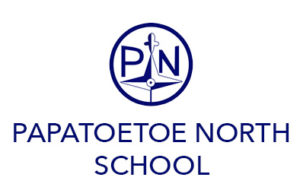 School Description
School DescriptionPapatoetoe North School is a large multicultural, low socioeconomic primary school in Auckland, New Zealand. The 800+ roll is made up of predominantly Pasifika, Maori, and Indian children and over a third of the school population are English language learners. The school has been working with an external facilitator to develop a rich localised contemporary curriculum design that reflects the importance of culturally responsive classroom practise. The Education Review Office describes the school as a dynamic learning organisation. As such they are well recognized for the quality of academic programmes, the high standards of pupils’ performance, the commitment of the teaching faculty, and the support they receive from the community. The school aim is for all Years 5 and 6 children to be independent writers and spellers, reading close to, or better than, their chronological age, and have mastered level three in numeracy. These pupils then focus on applying and extending curriculum knowledge, attitudes, and skills in all the National Curriculum areas, and be well prepared for intermediate school. This has had a significant impact on reversing national and international trends in achievement data in Years 4-6. Teachers strive to develop a school where children are secure, happy, and purposeful, and where they are motivated to give of their best. High standards are set in all that is undertaken, and our goal is that all children will work towards achieving personal excellence.
You can read more articles like this in our new Curriculum Magazine:
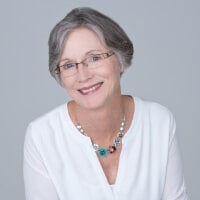 Chic Foote is a New Zealand educator with many years’ experience in developing curriculum mapping processes for effective contemporary curriculum design both nationally and internationally. She has worked extensively with Papatoetoe North School over more than 10 years.
Chic Foote is a New Zealand educator with many years’ experience in developing curriculum mapping processes for effective contemporary curriculum design both nationally and internationally. She has worked extensively with Papatoetoe North School over more than 10 years.
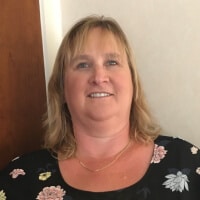 Wendy Currie is a Senior teacher and a member of the school leadership team. As leader of the Curriculum Mapping team, Wendy has a key role in developing and facilitating the school wide curriculum mapping process.
Wendy Currie is a Senior teacher and a member of the school leadership team. As leader of the Curriculum Mapping team, Wendy has a key role in developing and facilitating the school wide curriculum mapping process.
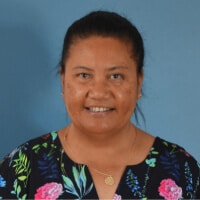 Marieta Morgan is Deputy Principal at Papatoetoe North School where she leads and guides teachers in culturally responsive classroom practice, ensuring that knowing the learner in their cultural context is at the heart of planning and teaching. She is a pedagogical leader skilled at aligning connected curriculum, school wide.
Marieta Morgan is Deputy Principal at Papatoetoe North School where she leads and guides teachers in culturally responsive classroom practice, ensuring that knowing the learner in their cultural context is at the heart of planning and teaching. She is a pedagogical leader skilled at aligning connected curriculum, school wide.
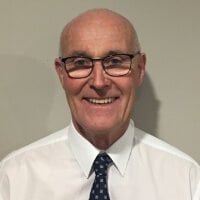 Peter Conroy is the Principal of Papatoetoe North School. He is an experienced school leader who has the learner and their families at the heart of all leadership decisions.
Peter Conroy is the Principal of Papatoetoe North School. He is an experienced school leader who has the learner and their families at the heart of all leadership decisions.
Check out our upcoming events that support Equity in Education!
Racial Equity in Education: Beginning the Conversation
 In this monthly group, we will get together to collaborate, learn about, and discuss racial equity and diversity in schools.
In this monthly group, we will get together to collaborate, learn about, and discuss racial equity and diversity in schools.
